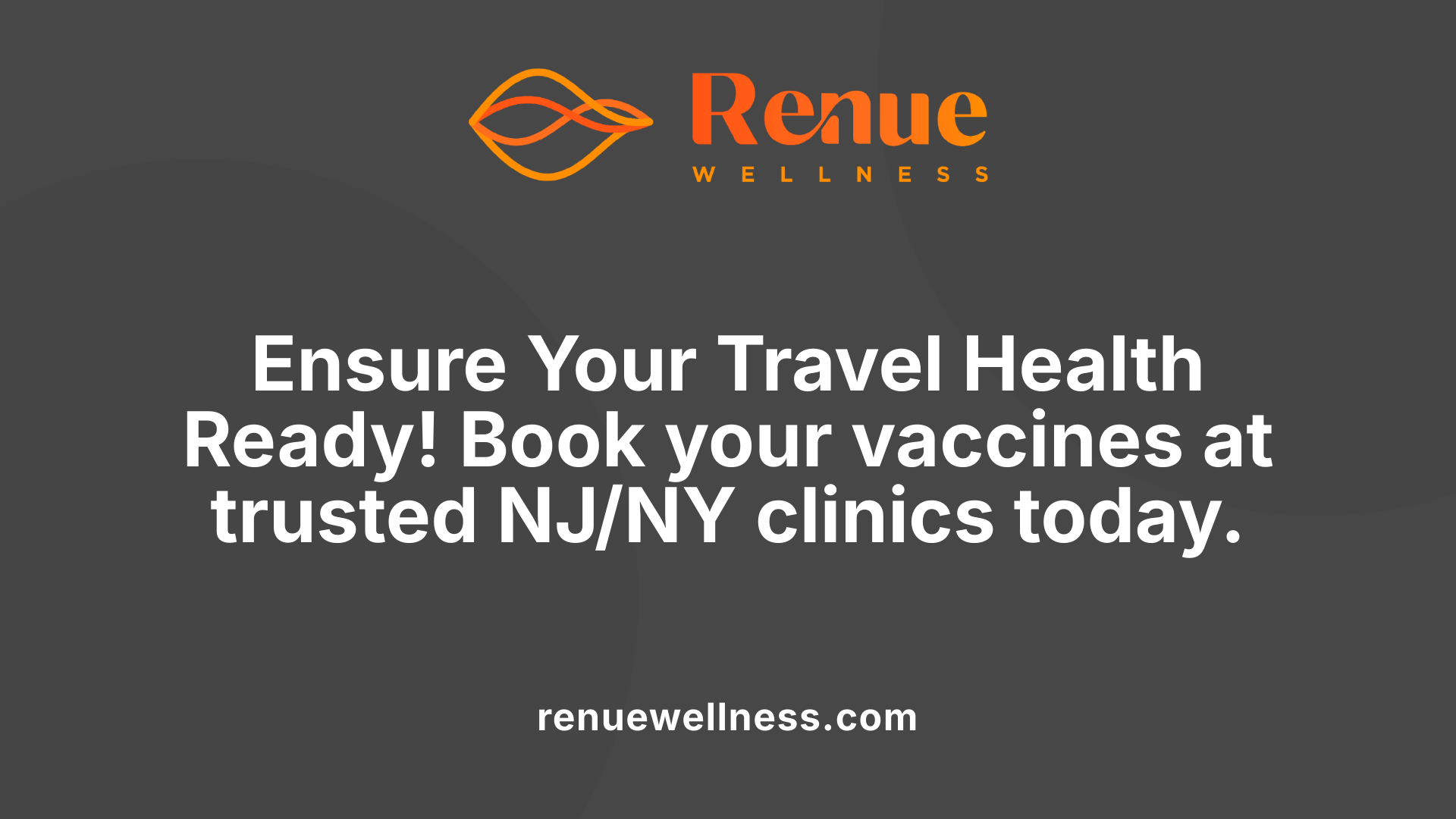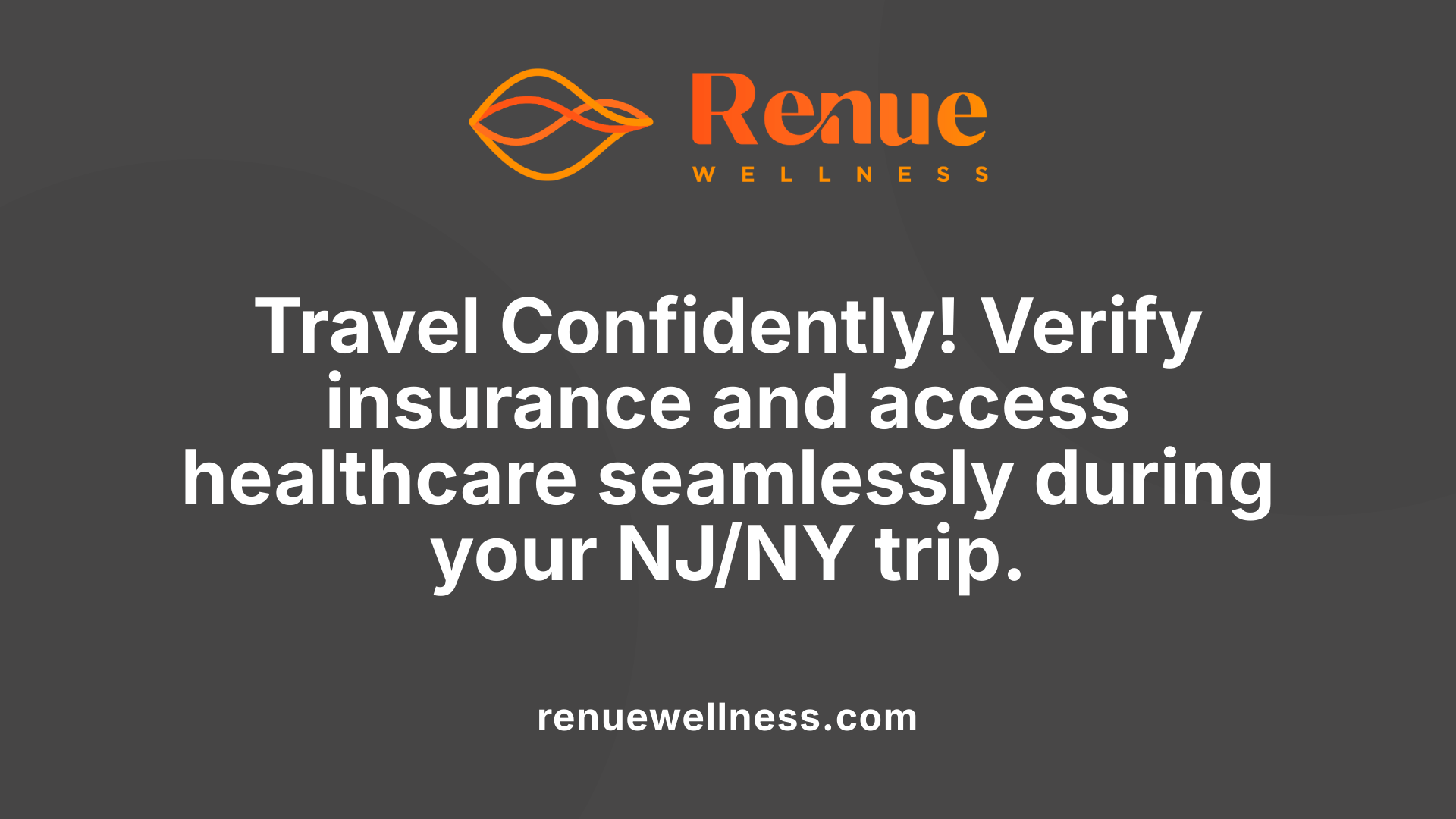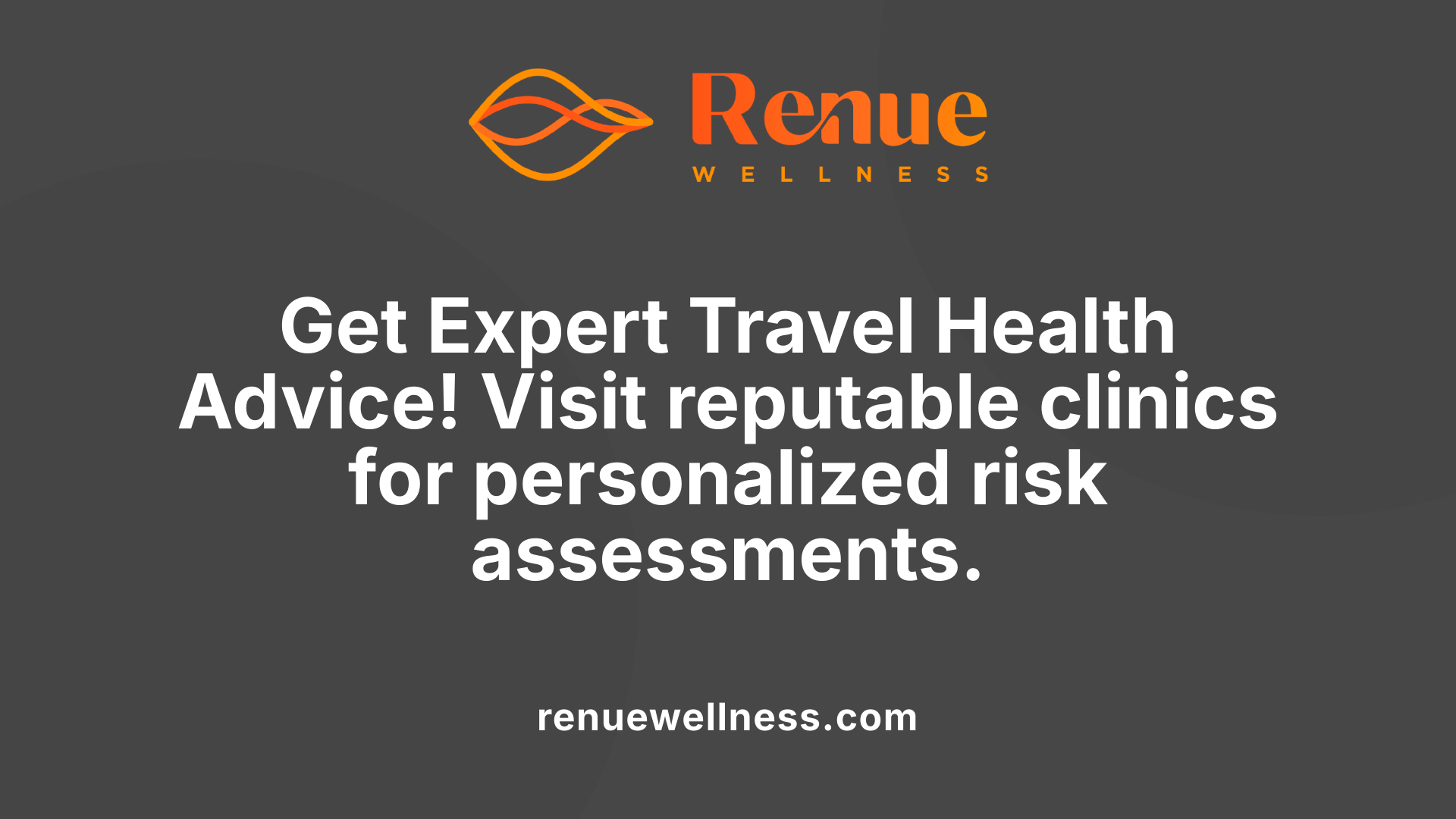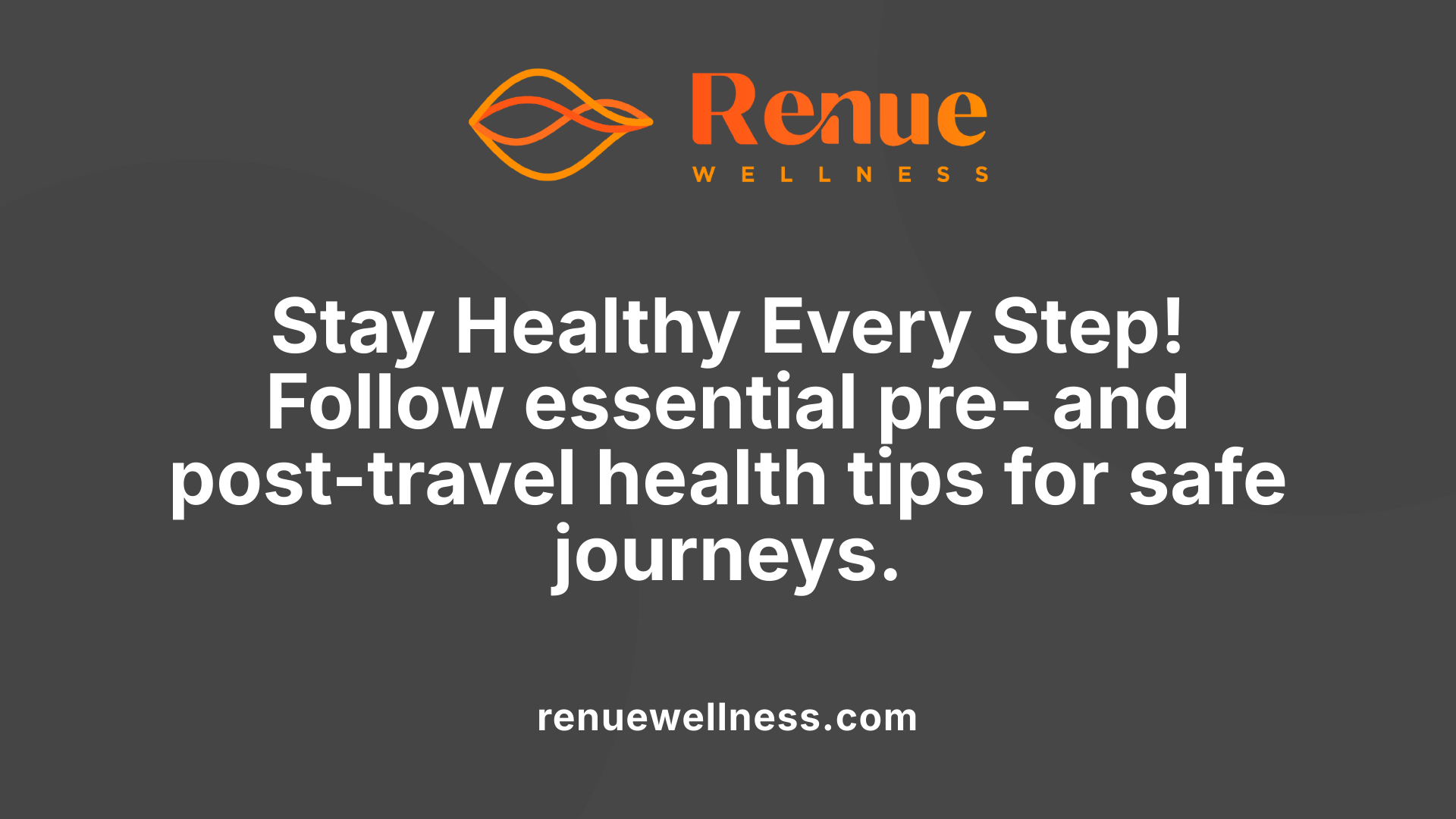Travel Tips for Out-of-State Patients Visiting Our NJ/NY Clinics


August 11, 2025
Your Comprehensive Guide to Visiting Out-of-State for Healthcare in NJ/NY
Traveling out of state for medical services in NJ and NY can be straightforward and safe with proper planning. From understanding vaccination requirements to navigating healthcare logistics, this guide offers essential tips to ensure your visit is smooth, safe, and focused on maintaining your health. Whether you're visiting renowned clinics like HSS, MSK, or local travel medicine centers, being well-prepared is key to a successful healthcare experience.
Pre-Travel Preparation and Vaccination Planning

What vaccination requirements and health recommendations should travelers consider when visiting NJ/NY clinics?
Travelers from New Jersey and New York planning international trips should prioritize a comprehensive health review at reputable travel clinics such as Maimonides or Passport Health. These clinics offer a broad range of vaccinations tailored to the specific destination and health conditions.
Routine immunizations like MMR (measles, mumps, rubella), influenza, and hepatitis B are essential, especially considering recent outbreaks and seasonal flu trends. Ensuring these are up-to-date provides a baseline of health security.
In addition, travel-specific vaccines are critical depending on the destination. These include vaccines for yellow fever, typhoid, hepatitis A, and Japanese encephalitis. For example, yellow fever vaccination is necessary for travel to tropical regions in South America and Africa, and must be administered at least 10 days prior to departure at authorized clinics.
Experience shows that timing is crucial when scheduling vaccinations. Many vaccines require multiple doses over several weeks to establish full immunity. It is recommended to schedule a pre-travel consultation at least four to six weeks before traveling. This allows ample time to receive vaccines, especially those needing multiple doses, and to comply with health regulations.
How should travelers gather official health documentation?
Obtaining official travel vaccination documentation is a vital part of pre-travel health planning. Clinics in NY and NJ, such as those operated by Passport Health, issue internationally recognized certificates after administering vaccines like yellow fever.
Travelers should ensure they receive these official documents, as they are often required for entry into certain countries and for compliance with health regulations. Carrying additional health information, including a personal vaccination history and prescriptions, can also be beneficial.
Additional tips for NJ/NY travelers
- Use insect repellent containing 20% DEET to protect against mosquito-borne diseases such as Zika, dengue, and yellow fever.
- Avoid consuming local foods that might carry health risks in unfamiliar environments.
- Apply sunscreen regularly to prevent sunburn during outdoor activities.
- Pack a comprehensive travel health kit with essentials, including any prescribed medications.
By planning early and consulting with specialized travel health professionals, travelers from NY and NJ can ensure all immunizations and health measures are in place, making their journey safer and more enjoyable.
| Service Type | Vaccinations Offered | Additional Support |
|---|---|---|
| Routine vaccinations | MMR, influenza, hepatitis B, chickenpox, shingles, flu vaccines | Personal vaccination history review, documentation |
| Travel-specific vaccines | Yellow fever, typhoid, hepatitis A, Japanese encephalitis, typhoid | Destination-specific health risk assessments |
| Special services | Onsite vaccinations for businesses, TB testing, biometric screenings | In-house or mobile vaccination clinics |
Understanding these elements helps NJ/NY residents ensure comprehensive pre-travel health management, supporting safe international travel.
Navigating Healthcare Access and Insurance During Your Visit

How can out-of-state patients access healthcare services and ensure insurance coverage during visits to NJ/NY clinics?
Travelers and out-of-state residents planning to visit clinics in New Jersey and New York should start by verifying their insurance coverage for out-of-state care. Not all insurance plans automatically extend coverage beyond their home state, so it’s essential to confirm in advance.
Programs like BlueCard and Horizon Blue Cross Blue Shield’s Away From Home Care are designed to assist patients in accessing healthcare services across state lines. These programs allow insured individuals to visit participating providers nationwide, often with the same or similar coverage as in their home state.
Before scheduling any appointment, patients should contact their insurance provider or the healthcare facility to determine if their plan is accepted. It’s advisable to ask about co-pays, deductibles, and whether prior authorization is needed for specific treatments or preventive services like vaccinations.
Medicaid, a common insurance plan for many, has limitations when traveling across states. Typically, Medicaid coverage does not extend outside the participant’s home state unless in case of an emergency. If someone is on Medicaid and plans to stay in or visit a different state, they will likely need to reapply for coverage in their new state post-relocation.
For non-emergency outpatient visits, maintaining timely care depends on understanding these coverage restrictions. Ensuring that the clinic accepts your insurance before the appointment can prevent unexpected out-of-pocket expenses.
In cases where coverage is uncertain or unavailable, patients can explore virtual care options. Telehealth services provided by clinics or through primary care doctors’ plans are increasingly accessible. These services allow for virtual consultations, prescriptions, and health advice, often with coverage options similar to in-person visits.
Finally, many clinics and urgent care centers in NJ/NY accept walk-ins and offer urgent outpatient services without the need for appointments. These centers are a convenient option for minor illnesses or injuries but usually require confirmation of insurance acceptance beforehand.
In summary, proper planning and proactive communication with your insurance provider and healthcare providers can ensure smooth access to medical services during your visit. Confirming coverage, understanding limitations, and leveraging telehealth options are essential steps for traveling patients.
| Aspect | Details | Additional Guidance |
|---|---|---|
| Out-of-state coverage programs | BlueCard, Away From Home Care | Verify participation with your insurer |
| Insurance acceptance | Check with clinics | Confirm prior to appointment |
| Medicaid considerations | Limited across state lines | Reapply upon relocating |
| Virtual care options | Telehealth services | Utilize for convenience or emergencies |
| Walk-in and urgent care | Same-day services | Confirm insurance acceptance |
| Emergency care | ER visits for life-threatening issues | Always available regardless of insurance |
Travel Clinic Services and Health Risk Assessments

What should travelers know about travel clinics and how they operate?
Travel clinics are specialized healthcare facilities that focus on preparing travelers for international trips by providing a range of preventive health services. These clinics offer essential vaccinations, advice on avoiding illness, and health assessments tailored specifically to the destination and activities planned. For residents of Brooklyn, NJ, and NY, clinics like Maimonides and the New York Center for Travel and Tropical Medicine are accessible options.
These clinics provide comprehensive services, including immunizations for diseases like yellow fever, typhoid, hepatitis A and B, Japanese encephalitis, and more. They also offer guidance on malaria chemoprophylaxis, insect bite prevention, and safe food and water practices to prevent illnesses such as Dengue and Zika.
Staffed by qualified medical professionals, often certified by organizations like the International Society of Travel Medicine, the clinics evaluate personal health risks based on individual medical histories. They recommend suitable vaccines and preventive measures, making sure travelers are well-prepared.
Scheduling an appointment at least two weeks before departure is crucial. This allows enough time for vaccines to take full effect and for the necessary documentation to be issued. These documents serve as official proof of immunization, which might be required for entry into certain countries.
Travel clinics also offer personalized advice on health precautions tailored to specific regions and activities, ensuring travelers are informed about potential risks related to local diseases, insect-borne illnesses, and environmental hazards.
Beyond vaccinations, many clinics provide travel health kits, and many offer consultations for travel-related health questions via virtual appointments or at walk-in centers in drugstores and urgent care facilities, providing convenient options for travelers.
Destination-Specific Health Risk Evaluations
Travel clinics assess the health risks associated with different destinations, such as tropical regions in South America and Africa, where yellow fever and other diseases are endemic. Based on the travel itinerary, providers recommend appropriate vaccinations like yellow fever—an essential for trips to these areas—and offer strategies to mitigate exposure.
These risk evaluations include detailed guidance on what to pack, how to avoid insect bites using products like 20% DEET insect repellent, and precautions about local foods and water safety.
Personalized Health Advice from Medical Professionals
Travelers from NY and NJ benefit from personalized consultations that consider their medical history, current medications, and specific travel plans. This tailored advice ensures that each individual receives the most relevant protection measures.
For families traveling with children, clinics provide pediatric-specific services, ensuring young travelers also receive necessary immunizations and health counsel. Many clinics also offer business travel services, including onsite vaccinations and health checks, for corporate clients.
Documentation of Immunizations
Official documents confirming vaccination status are critical for compliance with international travel regulations. Clinics such as Passport Health, with locations across NJ including Bridgewater, Clark, and Lawrenceville, provide these certificates immediately after immunizations.
Having proper documentation is not only a legal requirement in many destinations but also an important record of health preparedness.
Additional Resources and Practical Tips
Travelers are encouraged to carry a first aid travel kit, ensure prescriptions are packed, and take preventive measures against insect bites. Insurance plans, like those from UnitedHealthcare, often include 24-hour nurse hotlines and telehealth services, adding support during travels.
Overall, utilizing these travel health services ensures safer, healthier journeys abroad, giving travelers confidence to explore while remaining protected from preventable diseases.
| Service Type | Location/Provider | Description | Additional Notes |
|---|---|---|---|
| Vaccination Services | Maimonides Brooklyn & Passport Health NJ | Comprehensive immunizations, including yellow fever, hepatitis, typhoid | Appointments recommended 2 weeks in advance |
| Specialized Travel Consultations | NY Center for Travel & Tropical Medicine | Destination-specific health risk assessments, health advice | Early booking advised |
| Walk-in & Urgent Care | Local drugstores, urgent clinics | Treat minor illnesses, minor injuries | Available without appointment |
| Corporate Travel & Services | Passport Health clinics | Onsite vaccinations, TB screening, biometric tests | Particularly useful for business travelers |
This array of services highlights how residents of NJ and NY can access tailored, effective travel health support. By choosing reputable clinics and planning ahead, travelers can ensure a smooth, safe trip.
Precautions for Staying Healthy Before, During, and After Travel

What precautions should travelers take to stay healthy and safe before, during, and after visiting NJ/NY clinics?
Ensuring good health for travel begins with thorough preparation. Travelers in the NJ/NY area should schedule a pre-travel consultation at reputable clinics like Maimonides or the New York Center for Travel and Tropical Medicine well in advance of their trip. This allows time to update any necessary vaccinations, such as yellow fever, typhoid, hepatitis A, or Japanese encephalitis, which are critical for destinations where these diseases are prevalent.
It is recommended to carry a well-stocked travel health kit. This should include prescriptions, over-the-counter medications, first aid supplies, insect repellent with at least 20% DEET, sunscreen, and personal hygiene products. Proper planning and packing are essential for addressing minor health issues promptly and avoiding unnecessary trips to local clinics.
During travel, adhering to health safety measures is vital. Practice good hygiene, such as frequent handwashing with soap and water or using alcohol-based sanitizers. Protect against insect bites by wearing long sleeves and pants, applying insect repellent, and avoiding outdoor activities during peak mosquito activity times. Following CDC health guidelines and local advisories helps minimize exposure to vector-borne diseases like Zika, dengue, and yellow fever.
Being aware of current health advisories and disease outbreaks from official sources like the CDC or local health departments is crucial. Travelers should monitor news updates and health alerts relevant to their destination, respecting local health protocols.
Post-travel, it’s important to monitor for symptoms such as fever, fatigue, or unusual health changes. Early consultation with healthcare providers is recommended if symptoms develop, to ensure timely treatment and prevent complications.
How can travelers from NJ/NY effectively prepare and protect themselves?
Travelers should verify that all vaccinations are current prior to departure. Many clinics, including walk-in options at local drugstores, provide convenient access to vaccines and minor treatment. For specialized immunizations like yellow fever, clinics such as Passport Health can provide certification required for entry into certain countries.
Carrying prescriptions, especially for medications that might be difficult to find abroad, prevents interruptions in treatment. Additionally, planning travel around clinics’ vaccination schedules—typically needing appointments at least two weeks in advance—is essential.
Understanding and practicing preventive measures, including avoiding high-risk foods or water, using insect repellents, and staying indoors during peak mosquito hours, greatly reduces health risks. Carrying a travel health kit and maintaining good hygiene habits further safeguard travelers.
Why is post-travel health monitoring important?
Monitoring health after returning from international trips is crucial because some diseases have incubation periods that extend beyond the duration of travel. For instance, diseases like malaria and typhoid may manifest days to weeks after exposure.
Travelers should be vigilant about symptoms such as fever, chills, or unexplained fatigue. If any such signs occur, seeking medical attention promptly allows for early diagnosis and treatment.
Keeping detailed travel history when consulting healthcare providers helps them determine the appropriate tests and treatments. Maintaining awareness of health issues prevalent in the visited regions, such as dengue or yellow fever, supports accurate diagnosis.
Overall, proactive health management before, during, and after travel minimizes risks and promotes a safe and healthy travel experience for residents of NJ/NY and visitors alike.
Emergency Procedures and Access to Urgent Care
How are medical emergencies managed abroad or after returning home?
Managing a medical emergency while traveling or after arriving home requires quick and informed action. First, identify and contact the local emergency services immediately. In most countries, dialing 112, 911, or the local emergency number connects you to urgent care. Ensure that the providers are reputable and licensed, especially in rural or less-developed areas where healthcare standards may vary.
When abroad, it’s essential to carry a list of nearby medical facilities that speak at least some English or your native language. This can help you communicate effectively during a crisis. Additionally, always bring your prescription medications in their original containers and include a letter from your healthcare provider explaining your treatment, which is helpful if you need to seek medical attention.
It is advisable to have access to a travel or international health insurance plan that covers emergencies, including medical evacuations if necessary. Contact your insurance provider’s emergency hotline for guidance on treatment options, billing, or arranging evacuation. Many plans offer 24-hour support who can coordinate care and logistics.
Preparing for potential medical evacuations
In some cases, local healthcare facilities may be unable to provide the level of care needed. If so, arranging for a medical evacuation (medevac) might be necessary. This can involve chartered flights or air ambulances equipped with medical staff and equipment. To facilitate this process, carry detailed insurance documentation and ensure your insurance policy explicitly covers medevac services.
Post-treatment follow-up
Once treatment is received, keep comprehensive records of all medical services, diagnoses, prescriptions, and expenses. These documents are vital for insurance claims, legal purposes, and ongoing health management. Upon return to your home country, schedule a follow-up appointment with your primary healthcare provider to evaluate your health status, complete any additional testing, and adjust ongoing treatment plans.
Effective emergency preparedness helps ensure a swift response in critical situations. Whether abroad or at home, proactive planning minimizes health risks and ensures access to quality care when needed most.
Community Health Resources and Low-Cost Care Options
What should travelers know about community health resources for low-cost or free medical services?
Travelers in the NJ and NY areas have access to numerous community health resources that provide affordable or free healthcare services. Community health centers and clinics in these regions are committed to serving the public regardless of insurance status or immigration background.
These facilities often offer a broad range of services including urgent care, preventive treatments, vaccinations, and care for minor illnesses. They are especially helpful for uninsured or underinsured individuals who may not have access to traditional healthcare options.
For travelers, knowing how to locate and utilize these nearby clinics can be invaluable. Resources such as local health department websites or federal directories like the Health Resources and Services Administration (HRSA) can help identify accessible clinics.
When visiting these clinics, it’s important to bring relevant identification and any medical records, especially if you require ongoing treatment or specific vaccinations.
Many of these community clinics operate on sliding scale fees based on income, making essential healthcare services more affordable. Eligibility for free or reduced-cost services can vary, so it’s useful to inquire about specific criteria.
These clinics can provide timely treatment for unexpected health issues that may arise during travel, offering peace of mind and practical support. As part of your travel planning, consider mapping out nearby community health centers—this ensures you’re prepared for any health emergencies.
Using community health resources not only supports your health but also building a connection with local healthcare services can streamline access in the future.
How to find and utilize local health resources
- Visit local health department websites for lists of clinics.
- Use online directories like HRSA’s Find a Health Center tool.
- Contact community organizations or immigrant support groups for local health options.
- Carry copies of your vaccination records and travel medical history.
- Ask about sliding scale fees and eligibility.
In conclusion, leveraging local community health centers in NJ and NY can keep travelers safe and healthy during their visits, providing access to vital services without financial hardship.
Ensuring a Safe and Successful Healthcare Visit in NJ/NY
Proper preparation, awareness of healthcare resources, and adherence to travel health precautions are vital for out-of-state patients visiting clinics in NJ and NY. By scheduling vaccinations early, verifying insurance coverage, and understanding local emergency procedures and community resources, travelers can focus on their health and recovery. With these tips, your visit to NJ/NY clinics can be safe, efficient, and focused on maintaining your well-being during your travels.
References
- Travel Medicine: Protecting Patient and Family Health While Abroad
- Travel Advice in New York, NY
- What are your medical care options while you're traveling?
- Central New Jersey Travel Clinics - Passport Health
- Communicable Disease Service | Traveler's Health - NJ.gov
- Travelers' Health - CDC (.gov)
- Travel Advice in New York, NY
Recent Posts
Conditions Treated
AnxietyDepressionOCDPTSDPostpartum DepressionPain ManagementSubstance AbuseSuicidal IdeationOur Location


